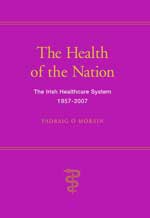A lost opportunity to critique Ireland's health service

In his latest book, 'The Health of the Nation', Padraig O'Morain details but fails to analyse the failings in Ireland's recent health policy. By Sara Burke
The Health of the Nation' was the title given to the now infamous public health policy document heralded by John Major in England in 1992.
The British practically invented public health. They put in place public health measures in the 1800s that increased life expectancy and improved people's quality of life before most other developed countries did. They also introduced a National Health Service to provide health and social care, free at the point of delivery to all its citizens, after World War II.
Then, in the Tory era, they had a lobotomy and produced The Health of the Nation, which placed responsibility for the causes and solutions to ill health on individual lifestyles and behaviours.
It seems strange to call any history of the Irish health services after this fiasco of British health policy, which has long since been abandoned.
The Health of the Nation. The Irish Healthcare System, 1957-2007, was commissioned by the VHI and published to coincide with their 50th anniversary. On the cover sheet it says the VHI chose not to commission a straight history of the company but instead chose a broader treatment of the history of Irish health services.
Another strange call considering Ruth Barrington and Maev-Ann Wren have already comprehensively and excellently written the history of Irish health policy and services in their respective books, Health, Medicine and Politics in Ireland, 1900-1970 and Unhealthy State, Anatomy of a Sick Society.
This book draws heavily on Barrington's history, but the author clearly has not read Wren's two definitive books on Irish health policy. If he had, this might be a very different ‘treatment' indeed.
 For people who know nothing about health policy, Padriag O'Morain's Health of the Nation is not a bad place to start. It's a quick read that provides the reader with a whistle stop tour of the history of and current state of Irish health policy and services.
For people who know nothing about health policy, Padriag O'Morain's Health of the Nation is not a bad place to start. It's a quick read that provides the reader with a whistle stop tour of the history of and current state of Irish health policy and services.
For those familiar with historical and contemporary health policy, this book is a bland and sterile, and at times frustrating
and inaccurate account of events past and present.
The Health of the Nation manages to bring the reader through the last 50 years of the healthcare system, virtually without mentioning the politics of health or people. This is a remarkable task. For health and health services are about as political and personal as it gets.
This book is written in the total absence of any critique of health and health service provision.
It fails to assess, let alone describe,the broader social and economic policies which cause poor people to get sick more often and die younger.
It spectacularly fails to highlight the failure of government to undo the structural inequalities in access to health care – the fact that public patients in one of the richest countries in the world in 2007 still have to wait to access,what can be life-saving, hospital services.
It doesn't even mention the growing call for a universal health system, funded by social insurance, particularly relevant in 2007 when the VHI is at a crossroads.
On many areas, such as the closure of the Health Education Bureau; the provision of Breastcheck; the use of the National Treatment Purchase Fund; the extent of AIDS; the abuse of older people in nursing home care; the crisis in A&E; the government's failure to meet commitments promised in the most recent health strategy; the book describes but fundamentally fails to explain why or how.
The second part of the book gives a brief history of the VHI. This provides the reader with an overview of health insurance in Ireland and is by far the most interesting section.
A good, detailed, critical history of health insurance in Ireland might have been a wiser way for the VHI to mark its fiftieth year.
